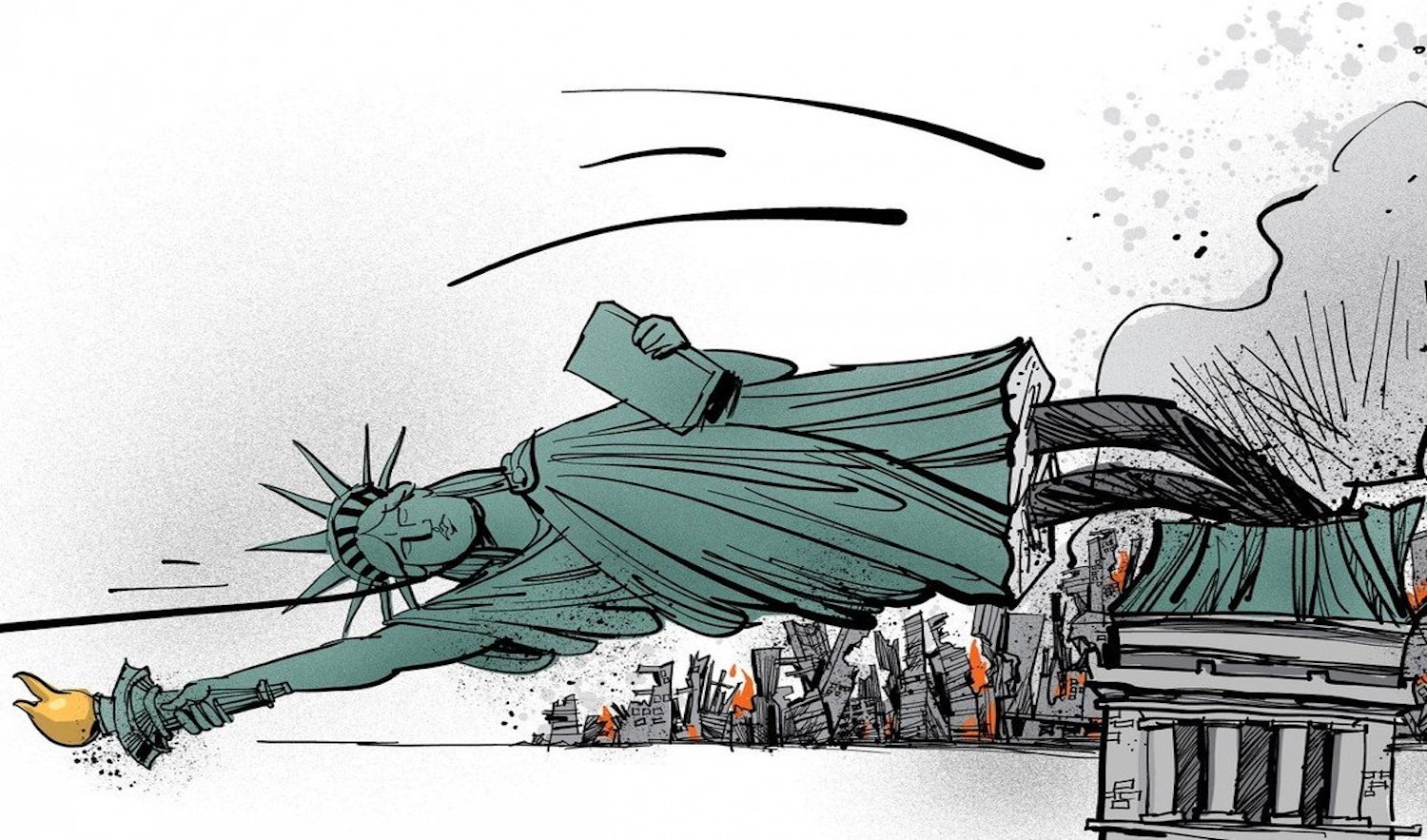TOM PLATE WRITES — Do dead sculptures tell no tales? Perhaps they still do. Recently the Pillar of Shame statue in Hong Kong, long displayed, was removed from the University of Hong Kong campus by the powers that be.
The sculpture had shaped the famous Tiananmen Square incident in terms of the bloody clash between soldiers and demonstrators. Last week, it was pointedly taken down and moved elsewhere, presumably not to appear in public for the foreseeable future.
Unfortunately, the Western news media has framed this story as another governmental clampdown on unwanted history. China is hardly the only polity where public statues and the like are towed out of sight, though.
Inconvenient historical facts bedevil people and governments all over the world. Lately, the United States has been cutting politically uncomfortable public displays down to size left and right.
Earlier this year in Richmond, Virginia, a giant statue of Robert E. Lee – one of the leading generals on the Confederate side of the American Civil War – was lifted by helicopter off its perch and dispatched into storage. The 12-tonne monument had sat in a prominent place for more than 130 years in Richmond, once the capital of the Confederate States of America.
Considered by many as one of the leading military tacticians of his era, Lee has been recast by contemporary politics into a symbol of sympathy for the days of the Confederacy, with its radioactive racism, and so needed to be airbrushed out in this era of historical retouching.
Virginia has swept under the rug many of the state’s Confederate displays on public ground. A statue of the Italian explorer Christopher Columbus in Richmond was torn down and thrown in a lake last year. Other Confederate monuments across the country have been cleansed from view in what cultural critics have deemed a sort of national political purge.
What is perhaps worse is that it appears any questioning of the wisdom of these disappearing acts is no more politically permissible than a careful weighing of the Tiananmen statue’s disappearance.
Right is right and wrong is wrong and that’s it. Minds are closing and historical statues have been junked in Belgium, England and elsewhere.
Something else might also be happening, at least in the US: the opening of deep fissures of instability. It is a potential nightmare in America, and some imagine the possibility of a new civil war.
I would judge this thought paranoid in the extreme, except for the fact that it is considered credible by some very smart thinkers. The meltdown scenario goes something like this:
Structural faults in the political system widen further, with the cracks becoming clear to see. Vast portions of the American electorate remain cruelly under-represented by a voting system tragically tweaked for decades by elites resisting power-sharing.
Non-white people especially are targeted and disenfranchised by Republican state legislatures, consciously diluting the principle of one person, one vote. Meanwhile, the federal judicial system can’t seem to neutralise toxic trends that are patently undemocratic.
Lay on top of this other irritants – including corrosive partisanship, ethnic tensions, labour issues and economic inequality – and you have a country that is disunited, a people frustrated and elected representatives sunk in dirty waters of corruption, ineptitude and denial.
Into this pessimism, I introduce the perspective of Gregory F. Treverton, a career intelligence analyst with high-level postings at the US National Intelligence Council during the Clinton and Obama administrations. Princeton- and Harvard-educated, Treverton is no ideological combatant but a concerned American who writes essays of exceptional insight.
In a recent post, he and Karen Treverton – a collaborator and manager of the Rand Terrorism Database – noted: “A half-dozen years ago, which now seems a different lifetime, one of us had the honour to chair the National Intelligence Council as we prepared Global Trends, the Council’s look into the future.
“A colleague from academia asked if we were taking the red-blue divide in the country seriously. Then he continued: ‘If you’re looking out 20 years, don’t you have to take seriously the possibility that the country will come apart physically?’”
Now the authors think this pessimism could well be on the mark. “Then, well before Trump, that exchange became the benchmark for thinking about America’s future. Now, it seems plain that a civil war is coming, and the only question is whether it will be fought with lawsuits and secessions or with AK-15s.”
Enemies of the US should not be cheered by these developments. A dysfunctional America with seething masses and a frustrated military that has difficulty winning wars of intervention could prove a nightmare for China, just as China or India veering into political instability would prove more than just a regional mess.
As the Trevertons put it: “Let us hope, though, that the coming civil war will be civil. However, in a country whose extreme violence by comparison to its kindred rich countries can only be accounted for by the omnipresence of guns, we would be foolhardy to bet on it.
“More ominous still for democracy, Americans who are or lean Republican are more than twice as likely to own guns as their Democratic counterparts.”
A fair point, but let’s not forget about the American political left, doing its best to vaccinate the population with politically sanitised ideas and junked statues.
The multilayered American political system has historically enjoyed osmotic propensities to soak in challenges of many kinds. But now, the system seems creaky and dried up, running more on myriad nostalgias than broad-based inspiration. A society feeling the need to put statues into storage needs to wonder about itself.
LMU Clinical Professor Tom Plate teaches in the university’s Department of Asian and Asian American Studies and is founder of Asia Media International.


One Reply to “US-CHINA RELATIONS: CRUMBLING US HAS NO BUSINESS TELLING OTHERS WHAT TO DO WITH THEIR STATUES”